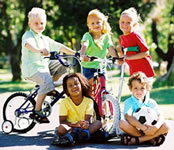 The prospect of starting school is an
exciting time for little people and their families. Many
parents and carers search for opportunities to make the
transition between pre-school and school as smooth as possible. The prospect of starting school is an
exciting time for little people and their families. Many
parents and carers search for opportunities to make the
transition between pre-school and school as smooth as possible.
One method is to have your child participate
in a transitional program. Not all services
offer these programs and if there isn't a transitional
program in your area don't worry, as there plenty of
things you can do together with your child to prepare
them for school.
How do Transitional Programs work?
Transitional programs are designed to involve
contact visits between teachers, parents and little people .
Usually the program is facilitated by local schools and
early childhood settings working together to introduce
the little people to the skills they will need at school
such as tying their shoe laces and going to the toilet
unattended etc.
Little people, with supervision,
may visit the Primary school which they will be attending
to see what school life is all about. Parents will be
asked to assist with travel and supervision arrangements.
Generally these programs commence before
the child starts school and continues after they start
school. If your little person has been in an early childhood
setting for a period of time they often love to go and
visit their old teachers and friends after they have started
big school.
Remember that your early childhood centre
may not offer a transitional program. If so it may be worthwhile
having a chat with them to see if it's possible to organise
a program.
Strategies to help your
child feel familiar with school.
Allow time for your child to mix and observe
the children in the playground.
Visit the toilet block, check out the
hand washing procedure with your little person and familiarise
them with what they need to do.
Pack their lunch and visit the school.
Try and time one of your visits at lunchtime so your little
person can have lunch with the other children.
Encourage conversation about your little
persons visit to school.
Visit the school canteen.
Schoolteachers will often have some work
for little people to do in the classroom.
Little people who have attended any form
of children's services prior to big school will experience
differences. School differs in many ways. There are fewer
adults and more children, class sizes are bigger, with
limited space, due to tables and chairs. The size of the
school buildings, and grounds and there are large numbers
of noisy children.
Continue
to page 2 >

|

